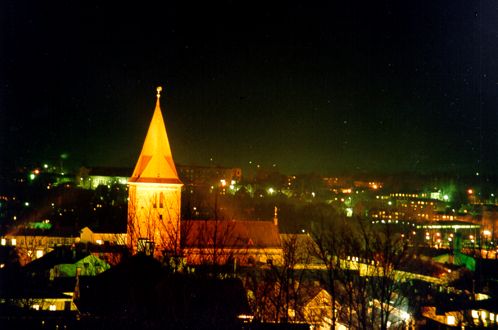 Geopolitically, Estonia is an odd duck. It's officially one of the Baltic trio, but it also finds itself coordinating with its glazed-over Northern neighbors while continuing to talk about Belarus with the Lithuanians.
Geopolitically, Estonia is an odd duck. It's officially one of the Baltic trio, but it also finds itself coordinating with its glazed-over Northern neighbors while continuing to talk about Belarus with the Lithuanians.That's because its national interests also intersect with Sweden and Finland and a prime example of this common interest is in the plan of Germany and Russia to lay the Nord Stream pipeline connecting the vast gas reserves of "Russia" (also known as Turkmenistan) with "Europe" (also known as Germany).
This project generated a sense of inevitability when it was first announced and an even greater sense of inevitability when Gerhard Schroeder officially became involved in the project. But Schroeder's decision to join up with Gazprom raised questions about the legitimacy of the project itself which is saying that it will be built by 2010, no matter what, even if they have to buy the Baltic Sea.
Estonia recently rejected Gazprom's request to survey its sea bottom, seeing the request as tantamount to giving the Schroeder bunch the green light to lay pipe in Estonia's territorial waters. Estonia was originally portrayed as a stubborn little pimple on the backside of Europe, but it stuck to its guns and began lobbying other Baltic Sea countries to ask Gazprom to evaluate a continental pipe, similar to Yamal, which runs through Poland.
But it seems that others have decided that Estonia has a point. Or maybe Estonia was just the first part of a broader Baltic Sea strategy for dealing with Nord Stream. Either way, Swedish Environment Minister Andreas Carlgren (above) said this week that Sweden is now taking a similar approach to Estonia's towards Nord Stream.
It is a good question as to why they would want to lay the pipe on the bottom of a sea rather than over land. Supposedly, it's those nasty Polish transit fees they are trying to avoid. Or maybe it's the threat from Polish environmentalists who could try to blow up the Nord Stream pipe should it go through the heart of the land of Kościuszko. Or maybe because they agreed to lay the pipe in the sea and ... it's just inevitable that they will do it, because Gerhard Schroeder is involved and he's a wealthy and powerful German guy.'In the information the company provided, it appears as if a more eastern laying would better avoid environmental problems and risks. It is now up to the company to show which other routes are possible from an environmental and risk point of view, and why it has chosen this particular route,' he added.
Who knows? All we know is that Estonia is no longer standing alone in this debate and that Germany and Russia can no longer wave their fingers at the troublesome New Europeans for stalling their project. Sweden is now on board too. Everyone wants to know why they have to build it in the sea for more money and more possible damage to the environment, when they can just lay it over land for less.































